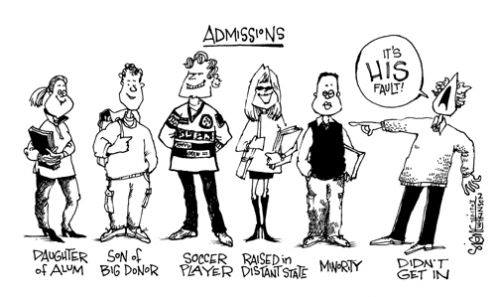Affirmative Action or Unfair Advantage?
March Issue: Social Justice

When I was young, my family would sit around the dining room table every night and start off the meal with the classic conversation starters. “Alex, how was your day? Did you learn anything new? Tell me what you learned.” From there I would tell my parents about a new fact I’d learned or how I could spell antidisestablishmentarianism really fast. But, and I could never quite grasp the transition; the conversation would quickly morph into a different language. I would hear phrases thrown around like, “gun control,” “George Bush,” and “Affirmative Action.” Growing up at a prestigious school with educated parents has given me the ability to finally learn the language my parents have been speaking.
A few weeks ago, we were sitting around the table and “Affirmative Action” came up. This is a conversation of hot debate in my house that usually ends in a moderate uproar. I listened to the two sides and realized that I didn’t have a clue what I agreed with. “Affirmative Action” is an extremely controversial topic not only in my household, but in American politics and the government.
The opportunity to give minorities the advantage in a competitive field creates two very distinct and understandable viewpoints. Affirmative Action typically focuses on the advantage for African Americans to attain jobs, attend colleges, etc. The belief is that because there is still a stigma towards educated African Americans in our culture, this advantage helps surpass that. Although this is debated as well, it is hard to deny that racism exists in the United States today.
In the course of a day, an African American student has to push through numerous barriers that I, and other majorities, cannot possibly begin to understand. From teachers subconsciously looking down on them, to being watched extra carefully at the drugstore. The correlation between race and economic standing is also significant; in 2012, the average income for a white household was nearly $60,000, while the income for a black family rested at $33,000 – nearly half the amount.
Granted there are always exceptions to these trends, the statistics show that there is a considerable gap between races. These disadvantages African Americans, and other minorities, face begs the need for a leg up in the workplace and the classroom.
On the other hand, the argument against Affirmative Action brings up the theory that a minority getting an advantage just creates further inequality. I think that an interesting aspect of the anti-Affirmative Action point of view that I haven’t heard discussed much, is the idea that everyone has disadvantages.
I’ve always thought that if race is considered when making a college decision, aren’t there hundreds of other factors that could be causing conflict in someone’s life? For instance, social class, gender, sexuality, home life, etc. Although I think colleges often attempt to focus on a “holistic” view of a student, I’m not sure it’s always successful. I think the work field struggles even more with taking into account these factors. So, according to Affirmative Action supporters, when applying for a job, should an upper class, black male with two parents with PhD’s and a comfortable home life still get an advantage over a lower class, white female whose parents dropped out of high school?
I think that this conversation caused a great deal of discussion at my dining room table for a reason. It’s incredibly hard to put ourselves in the shoes of others. No one will ever be able to know which of these two people I mentioned have a “harder” life, not to mention that it’s impossible to determine what a “hard” life really is.
No one can ever know exactly what it’s like to live any life other than their own. The girl with the difficult home life may believe she has it extremely hard, but has no idea what it’s like to grow up as a minority in the United States. This impossibility to determine who “needs” an advantage is what makes Affirmative Action so difficult.
I think the bottom line to this conflict is that whether or not Affirmative Action is fair or unfair, everyone has barriers that hold them back from succeeding in their field. Race is an easily quantified and noticed disadvantage, and should therefore be recognized and taken into account.
The key to ending the discussion about Affirmative Action is to keep it in place, while recognizing that nearly everyone has an aspect of them that is the minority. I have been lucky enough to attend an impressive high school and be raised by educated parents. I also have grown up as a mixed race female with issues of my own. I don’t believe that there’s anything wrong with giving racial advantage, I just believe there are other considerations to take into account as well.






































